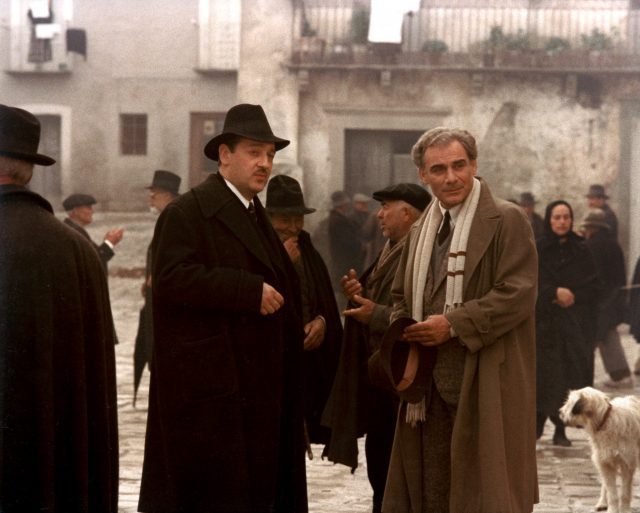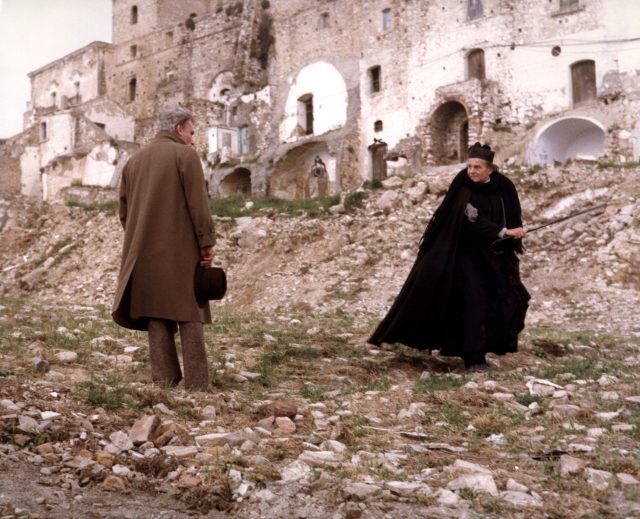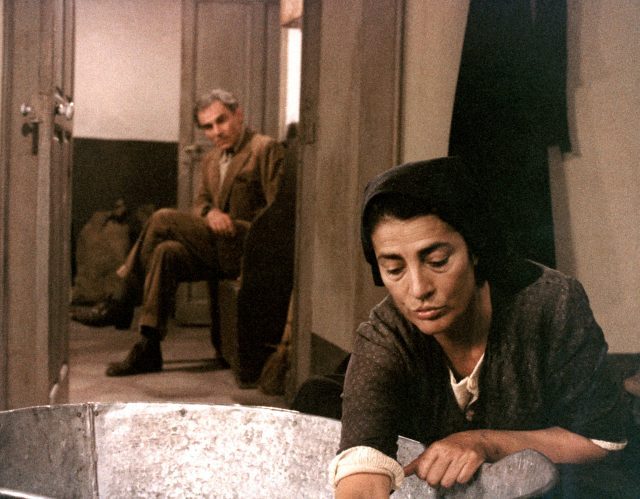
Mayor Don Luigi Magalone (Paolo Bonacelli) introduces political prisoner Carlo Levi (Gian Maria Volontè) to his remote Italian village in Christ Stopped at Eboli
CHRIST STOPPED AT EBOLI (CRISTO SI È FERMATO A EBOLI) (Francesco Rosi, 1979)
Film Forum
209 West Houston St.
April 3-18
212-727-8110
filmforum.org
www.rialtopictures.com
 Film Forum repertory programming director and Rialto Pictures founder and copresident Bruce Goldstein has spent some 30 years attempting to get the rights to restore and release the 220-minute television version of Francesco Rosi’s 1979 epic, Christ Stopped at Eboli. Now that he has succeeded in his personal quest for that holy grail, it’s easy to see why: The four-part foray into Fascism, faith, and forgotten peasants is a magnificent masterpiece. In 1935, Italian writer, painter, intellectualist, and anti-Fascist leader Carlo Levi (Gian Maria Volontè) was exiled to the remote mountain village of Lucania (now known as Basilicata) in the instep of Italy’s boot, where the small community lived much like its ancestors did. Levi recounted his experience there in his 1945 nonfiction novel, which Rosi adapted into a 150-minute theatrical film and the longer, more in-depth television version; the latter has its long-awaited US theatrical premiere April 3 at Film Forum in a glorious 4K restoration featuring a new translation by Michael F. Moore (who will introduce the 7:00 screening on Wednesday night).
Film Forum repertory programming director and Rialto Pictures founder and copresident Bruce Goldstein has spent some 30 years attempting to get the rights to restore and release the 220-minute television version of Francesco Rosi’s 1979 epic, Christ Stopped at Eboli. Now that he has succeeded in his personal quest for that holy grail, it’s easy to see why: The four-part foray into Fascism, faith, and forgotten peasants is a magnificent masterpiece. In 1935, Italian writer, painter, intellectualist, and anti-Fascist leader Carlo Levi (Gian Maria Volontè) was exiled to the remote mountain village of Lucania (now known as Basilicata) in the instep of Italy’s boot, where the small community lived much like its ancestors did. Levi recounted his experience there in his 1945 nonfiction novel, which Rosi adapted into a 150-minute theatrical film and the longer, more in-depth television version; the latter has its long-awaited US theatrical premiere April 3 at Film Forum in a glorious 4K restoration featuring a new translation by Michael F. Moore (who will introduce the 7:00 screening on Wednesday night).
“Christ stopped at Eboli. Where the road and the train abandon the coast and the sea, and venture into the wastelands of Lucania,” Levi says in early voiceover narration. “Christ never came here. Nor did time, the individual soul, or hope, nor did cause and effect, reason or history. No one has set foot on this land, except as a conqueror, an enemy, or an uncomprehending visitor. Today the seasons rush past over the toil of peasants, as they did three thousand years before Christ. In this dark land, without sin or redemption, where evil is not moral, but an earthly sorrow, in all things for eternity. Christ never descended. Christ stopped at Eboli.” It’s not that Jesus stopped in Eboli; he stopped at the edge of the town, without going into this godforsaken place.

Priest Don Traiella (François Simon) shows Carlo Levi (Gian Maria Volontè) the ruins of his church in Christ Stopped at Eboli
The film opens beautifully, with a shot of one of Levi’s paintings, of a child peering over its left shoulder, mouth turned in sadness, mountains in the background, as Piero Piccioni’s lush, aching score plays underneath. (The image is on the cover of Levi’s book Le parole sono pietre, which means “Words are stones.”) Rosi cuts to Levi’s face; with his heavily gray beard and mustache and thick, wavy hair, he resembles a biblical figure. His eyes search off camera, then he shifts his head to gaze at the painting; Rosi zooms in on the child’s forlorn face, and Levi remembers. “Many years have gone by,” he says, sitting in his studio as Rosi focuses on other paintings of distraught men, women, and children. “Years of war . . . and what we call history. Tossed about by fate, I could not keep the promise I made, when I said goodbye to my peasants, that I would return. And I do not know if or when I can keep it. But closed in a room, in a closed world, I indulge in remembering that other world. Imprisoned in its pain and customs, forgotten by history, by the State, eternally patient. That land of mine, without comfort or kindness, where the peasant lives in misery and isolation, in his motionless civilization, on arid soil, in the presence of death.” It’s an elegiac moment of a man measuring regret as the narrative travels back to 1935.
Levi is a gentle soul who has accepted his temporary fate, exiled from his native Turin to the middle of nowhere in southern Italy. He is staying in a dank room with a family who occasionally gives the second bed to an old friend or a local drunk. He speaks very little, instead taking it all in with his penetrating, thoughtful eyes. He can’t fraternize with the other political prisoners in the village (its real name is Aliano; Levi calls it Gagliano), but he does have conversations with the mayor, Don Luigi Magalone (Paolo Bonacelli), a loyal Fascist who censors Levi’s letters; the priest, Don Traiella (François Simon), an alcoholic with a meager flock; and a clarinetist tax collector (played by a street cleaner from Matera) who fills Levi in on the dire situation of the peasants, who have been ignored by Rome. He goes on long walks with his new dog, Barone, who adopted Levi at the Eboli train station, but he is not allowed to go past the local cemetery.
After his sister, Luisa (Lea Massari), pays him a visit, he gets better living quarters and starts painting again; he particularly wants to do a portrait of his housekeeper, Giulia Venere (Irene Papas), the only woman who is permitted to take care of his home because her virtue is already gone, as she has been pregnant seventeen times from numerous men. He takes a liking to Giulia’s young son Carmelino (Carmelo Lauria), who is curious about Levi. Meanwhile, when the townspeople find out that Levi is a doctor, they demand he treat them even though he tells them that despite his degree he has never practiced medicine. He looks around at the misery that is everywhere — gorgeously photographed by Pasqualino De Santis, using a muted, earthy palette that emphasizes the grayness that hovers over everyone as the camera focuses on a crumbling church, a small protest, the vast, desolate emptiness of the rocky landscape surrounding the village, complemented by Piccioni’s sweeping, melodramatic soundtrack — and tries to get by as basically as he can, without complaint or argument save for the occasional sly aside.

Giulia Venere (Irene Papas) is the only woman allowed to work for Carlo Levi (Gian Maria Volontè) in Francesco Rosi masterpiece
Volontè (A Fistful of Dollars, A Bullet for the General), who also appeared in Rosi’s Many Wars Ago, The Mattei Affair, Chronicle of a Death Foretold, and Lucky Luciano (which is screening at Film Forum on April 14), is impeccable as Levi, who carries himself with grace and dignity, participating in life with the peasants and holding his tongue as news reports announce Il Duce’s invasion of Abyssinia, although he sometimes can’t help but mildly scoff at many of the villagers’ uniquely strange rituals and beliefs. He recognizes his elitism but refuses to flaunt it. While Rosi (Salvatore Giuliano, Three Brothers) includes elements of neo-Realism, Christ Stopped at Eboli is a contemporary fable with surreal touches, with a cast of professional and nonprofessional actors who successfully form a cinematic community, encouraged to improvise to heighten reality. It’s a tenderly told tale of southern Italy — Rosi was born in Naples — and a town that has turned its back on a country that has turned its back on it. The film is imbued with a magical mysticism that is intoxicating; it’s clear why Goldstein spent decades trying to bring it back to life, and now it’s a gift for us all.